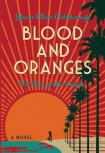Blood and Oranges, James Goldsborough [spicy books to read txt] 📗

- Author: James Goldsborough
Book online «Blood and Oranges, James Goldsborough [spicy books to read txt] 📗». Author James Goldsborough
He buried Nyx at the back of the duplex in the dirt area by the fence that separated his house from the yard behind. Afterward, he went into the bedroom and took down a shoebox from the closet. He sat on his bed, opened the box and took the Remington Derringer from the oilcloth in which it had lain wrapped since he’d taken it from his backpack years before. He took out a box of .41 shorts and carried pistol and ammunition into the kitchen. He fired the gun a few times, watching the firing pin move between the twin barrels at each pull of the trigger.
The firing made a pure, clean sound, one he hadn’t heard in years, the sound of perfect engineering, of metal turned to the highest precision. He’d used the pistol before, but never to kill. He put a round in each barrel and aimed at the window. The half-moon handle felt natural in his gnarled hand. He took the rounds out, laid them on the table and pulled the trigger a few more times, getting used to the feel again and to the sound of metal on metal. It was an old gun, he doubted that they even made them anymore, but it was the only revolver he’d ever owned. He oiled it, wiped it clean with a rag and put it back in the shoebox in the closet.
He’d never driven a car, never learned, never cared to. In the mountains and deserts you used horses or mules or walked, and in town you used buses and trolleys. Los Angeles had a good trolley system, the Red Cars and the Yellow Cars, and where one wouldn’t take you the other would. Callender loved trolleys, rode them everywhere, rode some of them to places like Redondo Beach that didn’t have many people. Los Angeles was a smart city, running lines to places it wanted people to live and bringing them along afterward. That’s how the San Fernando Valley was built, first the trolleys, then the people. Next they ran lines to the beaches so the people could get away from the growing mess that was downtown.
His favorite line was the Pacific Electric car west to Culver City, on to Playa del Rey and south along the beaches to Manhattan, Hermosa and Redondo. It was his favorite Sunday after-church excursion, less than an hour from the temple to the pier in Redondo with only two changes and the whole thing for half a dollar. He’d get a good seat by the window and watch the city clang by—downtown, west on the avenues, past MGM Studios, through the beanfields to the coast. He’d slow his mind and just observe. From years of prospecting, he’d learned not to think, to empty the mind, just be. At Redondo, he’d walk out on the pier and drink a beer, eat a sandwich and watch the men with their lines in the water. The women would come out, too, pushing prams and spinning parasols, enjoying the bracing ocean air. Life as it should be.
He never took the Venice line anymore, the Short Line they called it. Once it had been his favorite, especially Sundays when he had time before the evening show at the temple, and he’d catch it downtown, get off at Windward Avenue in Venice and stroll the strand with other Sunday flâneurs to Ocean Park. But Venice changed after it was annexed by Los Angeles and got a Sunday “sin” exemption, allowing Eddie and his crowd to turn the strand into a tawdry place of hawkers and hucksters and women who didn’t bother to hide what they had and what they were. Henry had worked with Willie to clean up Venice, to close up the dancehalls and brothels, but they’d lost that fight, lost it to Eddie, and Henry didn’t go to Venice anymore.
But today he was. Dressing, he’d surprised himself by taking out his old clothes, not the new ones he’d worn since coming to the temple. Maybe that was the trouble: he’d shed his old skin, which was his real skin. That had been Willie’s problem too. The old clothes had been hanging for a while. The Stetson was up there, and he gave it a few swipes with a brush. The boots needed polishing, but he didn’t bother. He took the Remington Derringer out of the shoebox, loaded it and put it on safety. He walked into the kitchen and suddenly had a thirst, squeezing a couple of blood oranges and downing the pulpy red juice in a few gulps, feeling it hit bottom. A small, light gun, the Derringer bulged no more in his jacket pocket than a good wad would do if he’d had one. He combed out his mustache and set out for the Short Line.
He caught the trolley at the Hill Street station and rode it past Venice to Ocean Park where he’d first met Eddie at the beauty contest and stayed on to the end of the line at Santa Monica City Hall. From city hall it was





Comments (0)